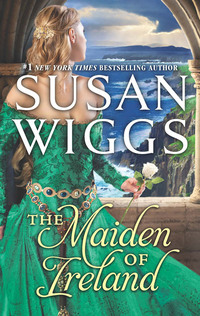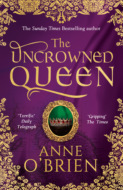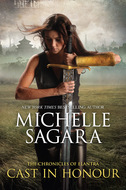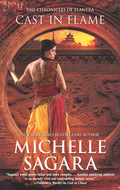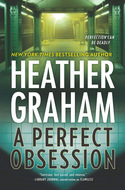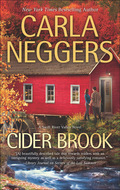Raamatut ei saa failina alla laadida, kuid seda saab lugeda meie rakenduses või veebis.
Loe raamatut: «The Maiden of Ireland»
#1 New York Times bestselling author Susan Wiggs sweeps readers away to the misty coast of Ireland in an irresistible tale of falling in love with the enemy…
John Wesley Hawkins was condemned to hang, accused of treason and heresy. As he’s transported to the scaffold at Tyburn, however, the Lord Protector steps in and offers him the hand of mercy—if Wesley agrees to travel to Ireland on a dangerous mission into the heart of the Irish resistance against English rule. He’ll have to seduce the rebels’ secrets from a headstrong Irishwoman, but that shouldn’t be a problem for a man of Wesley’s reputation….
Caitlin MacBride is mistress of the beleaguered Irish castle Clonmuir, and she makes no secret of her loyalty to her countrymen. She’s determined to remain strong for her people, but a wish for true love one evening at sunset yields the one thing that may sway her resolve. When Wesley walks out of the mist that fateful night, Caitlin’s faith in the magic of Ireland is briefly restored—until she discovers he’s one of the treacherous Englishmen she has spent her life fighting against.
Praise for the novels of Susan Wiggs
“A classic beauty-and-the-beast love story that will stay in your heart long after you’ve turned the last page.”
—New York Times bestselling author Kristin Hannah on The Lightkeeper
“Wiggs has a knack for creating engaging characters, and her energetic prose shines through the pages.”
—Publishers Weekly on Enchanted Afternoon
“Susan Wiggs delves deeply into her characters’ hearts and motivations to touch our own.”
—RT Book Reviews on The Mistress
“[Wiggs] has created a quiet page-turner that will hold readers spellbound as the relationships, characters and story unfold. Fans of historical romances will naturally flock to this skillfully executed [Chicago Fire] trilogy.”
—Publishers Weekly on The Firebrand
Also by SUSAN WIGGS
CONTEMPORARY ROMANCES
Home Before Dark
The Ocean Between Us
Summer by the Sea
Table for Five
Lakeside Cottage
Just Breathe
The Goodbye Quilt
The Lakeshore Chronicles
Summer at Willow Lake
The Winter Lodge
Dockside
Snowfall at Willow Lake
Fireside
Lakeshore Christmas
The Summer Hideaway
Marrying Daisy Bellamy
Return to Willow Lake
Candlelight Christmas
The Bella Vista Chronicles
The Apple Orchard
The Beekeeper’s Ball
HISTORICAL ROMANCES
The Lightkeeper
The Drifter
The Mistress of Normandy
The Tudor Rose Trilogy
At the King’s Command
The Maiden’s Hand
At the Queen’s Summons
Chicago Fire Trilogy
The Hostage
The Mistress
The Firebrand
Calhoun Chronicles
The Charm School
The Horsemaster’s Daughter
Halfway to Heaven
Enchanted Afternoon
A Summer Affair
The Maiden of Ireland
Susan Wiggs
Refreshed version of THE MIST AND THE MAGIC,
newly revised by author
Contents
Cover
Back Cover Text
Praise
Booklist
Title Page
Prologue
One
Two
Three
Four
Five
Six
Seven
Eight
Nine
Ten
Eleven
Twelve
Thirteen
Fourteen
Fifteen
Sixteen
Seventeen
Eighteen
Nineteen
Afterword
Extract
Copyright
Prologue
Tyburn Hill, 1658
The executioner wondered why so many women had come to watch the priest die. Were the ladies of London so bored, then, that the spectacle of a poor wretch being tortured to death lured them from their bowers?
Thaddeus Bull scratched his head through his black hangman’s hood. He had never understood the fascination of the Londoners. Give him a pint of ale, a joint of mutton and a smiling maid; that was all the entertainment he needed.
Strangely, these women represented every layer of society. Masked noble ladies in boxy coaches held pomander balls to their noses. Country maids in faded dresses moved their lips in silent prayer. Tradeswomen and merchants’ wives whispered behind their hands.
A bevy of seasoned Southwark whores brayed at one another in their sharp, rough speech. One of them elbowed a path toward Bull, tossed him a coin, and said, “Please, sir, be merciful!”
Bull ignored the plea and the coin. Only in lean times would he stoop to accepting a bribe from a whore. Thanks to Lord Protector Cromwell, present times were not lean.
Through the black rim of his woolsey hood, Bull caught a flash of silver from a woman’s throat: a crucifix or a Lamb of God, no doubt, worn in defiance of the ban on popish idolatry.
Guards flanked the road leading to the gallows where the priest would hang. Like Bull, Cromwell’s soldiers seemed struck by the abundance of female spectators. Their hard gazes roved over the throng, resting on a comely maid here, a buxom gentlewoman there.
Thaddeus Bull heard the unmistakable scraping noise that heralded the arrival of the prisoner. He glanced at the noose, swinging in the brisk spring wind. Thick hemp for this one, the sheriff had ordered. Thin rope strangles a man instantly and spares him the agony of the drawing and quartering.
The authorities, Bull knew, wanted Father John to feel every moment of slow strangulation, every stroke of the sword. Bull’s gaze moved to the blade of his knife. Specially wrought in Saxony, the weapon was designed to slit a man cleanly from gullet to crotch. He had honed the edge parchment thin, for he was no butcher to hack away at a poor sod, priest or not.
Thaddeus Bull was a simple man, but he knew guilt when he felt it. He could almost taste it in his mouth, like a knobby piece of mutton gristle.
Bull cleared his throat. He wished he could spit on the ground but the hood prevented it. Meting out justice was his job and he was paid to do it. Many of the condemned, eager to secure a place in paradise, gave him gold coins as tokens of their absolution—not as bribes. But he would accept no inducements today, for this priest was to die hard.
The crowd hushed. Between the beats of the dirge-like drum rhythm came the sliding sound of the wattled hurdle.
Amid the ranks of soldiers rode the sheriff. Behind him plodded a massive horse, its great lower jaw yawning at an iron bit. Harnessed to the beast was the hurdle, a plastered oaken beam dragged along like a narrow sledge.
The prisoner rode with his back aligned on the length of wood, bound at his hands and feet and waist.
The three-mile journey from Tower Hill hadn’t been easy, Bull observed. Bumping over the cobbled streets of Cheapside, through the mud puddles and horse dung of Holborn, and being dragged through the ripe garbage of the Strand had taken its toll. Father John’s face, hair, and robes were covered in filth.
The eerie silence drew out. Bull waited to hear the customary jeers, but none rang from the perfumed throng.
A plump doxy broke through the ranks of the soldiers. Before they could stop her, she dropped to her knees beside the priest and used a damp white cloth to cleanse his face and beard and hair. A soldier dragged the woman away.
Father John raised his clean face to scan the onlookers.
Then the weeping began.
Never had Bull heard the like: great, heartfelt sobs, high-pitched wails, ragged hopeless sounds that seemed wrenched from the very souls of the weepers.
Bull adjusted his hood, the better to see the priest. His long hair was a greasy, matted mane the indeterminate hue of London mud. The beard straggled several inches below his chin. Blast, thought Bull. Beards were a nuisance.
The priest’s deep-set eyes were as blank as polished stones. The face bore the ravages of a course of torture that, according to Tower rumor, hadn’t drawn so much as a word from Father John. His silence had defied the rack, the wheel, the iron maiden. One interrogator swore the priest was a practitioner of the black arts who was capable of slipping into a trancelike state. Others said he had lost his mind.
Bull heard a whisper, light and feminine, as sweet as a psalm sung by an angel. “Wesley. Oh, Wesley, no...”
Who the devil is Wesley? Bull wondered.
* * *
John Wesley Hawkins, formerly a king’s cavalier and presently a condemned Catholic novice, hoped no one of consequence had heard the whisper of his true name. For six years he had kept his identity a secret, known only to England’s underground Catholics and a few well-placed royalists.
How ironic to be discovered by the authorities now.
But he just might be. For he heard the name Wesley being hissed from woman to woman.
He was surprised and a little dismayed at the size of the crowd that had come to witness his launch into eternity. It was daunting to have to face so much desperate grief all at once.
Save it, he wanted to say to them. I’m not cut of the cloth of a martyr, never was.
Some men craved the fate that awaited Hawkins. They prayed for the day their tormenters would put their wills to the test and their souls to rest. They envisioned a glorious death and, afterward, elevation to sainthood.
Sainthood had a certain lofty appeal, but it wasn’t strong enough to make John Wesley Hawkins crave death.
Not just death, he reminded himself morbidly, but choking until death kissed his soul; then, still alive, he would be cut down and his body sliced open, his insides drawn out and his heart carved from his chest. Then the beheading and quartering, his parboiled parts displayed publicly to warn off those who dared practice the Catholic faith. A costly commodity, this sainthood.
He hoped he would lose consciousness at the first stroke of the knife, but he had never been a squeamish man and couldn’t count on fainting. At Worcester, he had survived a sword wound that would have killed most men. As a further taunt to death, he had stitched the gash with his own hands.
In the Tower, he had refined his ability to resist pain. He remembered little of the rack and less of the hot irons; the burns and bruises only tormented him later.
Someone removed the ropes. Blood rushed to the tips of his fingers and toes, so swift and hot that it hurt. But what sweet agony! His very blood had taken up the refrain he had been trying—and failing—to ignore: I want to live. I want to live.
But his fate was here, on this infamous hill surrounded by green fields and budding trees and weeping women.
As soldiers hauled him to his feet and shoved him toward the hangman’s cart, he allowed himself a last look at his mourners.
All those women. Some harkened back to his misspent youth. Others were devout followers who had embraced his later cause. There were pretty women and plain ones, rich ones and poor ones, women he had liked and women he had merely lusted after.
Good Lord, he thought. How quickly they had all discovered his identity. He suspected only a few had actually known him; the rest had been drawn by rumor and improbable tales that grew larger with each telling. Gossip through the Catholic underground flowed as swiftly as a river during flood season.
Yet despite their grief, he could summon no sentiment toward them. Torture had scoured all emotion from John Wesley Hawkins.
Until he thought of Laura.
The very thought of the child brought a shimmer of light into his soul. A sense of loss made the impending horrors seem no more threatening than a stroll through Bartholomew Fair.
Sweet Jesus, keep her safe. It was as close to true prayer as Hawkins had ever uttered, despite his vocation. Priesthood had been a foolish choice, one made in haste and desperation and a yearning simply to belong. He was glad Laura’s appearance in his life had stopped him from taking his final vows and forever binding his life to the church.
Only hours before his arrest, he had paid a widow named Hester Clench to pass Laura off as her niece and speed the three-year-old to safe obscurity. Now the widow Clench possessed the only person who truly mattered to him.
He pictured Laura’s round baby face, the profusion of rose-gold curls that gave her the look of a cherub. The memory of her childish laughter stabbed at his heart, for he would hear that sound no more.
Ah, the pain of it. Never to exclaim over his child’s first lost tooth, never to see her grow tall and willowy and beautiful, never to play the stern papa evaluating her suitors.
Heat prickled in his throat. He fought the tears. If his death were to have any meaning at all, he must die well.
He was a king’s man to the end, he wanted people to say. If he could coax admiration from this hard London crowd, jaded by so many executions, his death might make a difference, after all.
Goaded by the hangman, Hawkins stepped into the two-wheeled cart hitched to a mule. So this was where his life would end. No more saying mass in barns and cellars, always one jump ahead of the priest catchers. No more whispered messages to royalists, always looking over his shoulder for Cromwell’s hunters.
At the back of the crowd, a man in an opulent high-collared robe dismounted and tried to jostle forward. A felt hat, with the brim tilted up at one side and held in place by a golden clasp, shadowed his face.
He seemed to be shouting, but the wailing of the women and the beating of drums drowned his cries. Recognition niggled at Wesley’s torture-numbed brain, prodding a memory.
The executioner stepped up beside him. The cart groaned under the giant’s solid weight.
Good, thought Hawkins. The big lout should be able to put him out of his misery quickly.
A cleric arrived. He wore a black cloak unrelieved by ornamentation, and a hat with a round, flat brim. Wesley wondered which sect was in fashion at the moment. Puritan, Anabaptist, Leveler...he couldn’t keep all the Protesters straight.
“You’ve a dire sentence hanging over you,” said the cleric.
Hawkins shot a wry glance at the noose. “So it seems.”
“Recant, sir, and spare yourself from the sword.”
Wesley allowed a hint of wistful regret to soften his features. “My good friend, I cannot.”
Impatience tautened the cleric’s mouth. “You’re as insincere a priest as they come. Why play the martyr?”
“Better to die a martyr than to live a traitor.”
“Then you’ll suffer the full agony of the sentence. I shall pray for your everlasting soul.”
“Do that, and you’ll surely send me to hell.” Wesley turned to the executioner and sketched the sign of the cross. “For what you are about to do, I forgive you.”
“Aye, sir, you’ll not trouble my sleep.” The hangman had a deep voice muffled by the hood, and an East London accent. Wesley wondered what the man thought about, what he did with himself when he wasn’t torturing people to death. Did he stop off at the Whyte Harte for a pint of the plain, rocking back in his chair and regaling his cronies with morbid tales?
The giant removed Wesley’s filthy cloak and shirt. Cool air tingled over his bare chest and arms. Sighs gusted from the women, whether at the scars from the lash or at the musculature of his stomach and chest, he couldn’t tell.
The hangman flung the garments out of the cart. Feminine hands grappled for the clothing. As his wrists were tied behind his back, Hawkins winced at the pain. He heard the sound of rending fabric, shrill voices arguing. Each scrap of his cloak and shirt would be sold off as a holy relic.
Saint John Wesley Hawkins. It had an interesting ring. He would be made patron of something, but what? Liars and cheats? Gamblers and skirt chasers? Defrocked priests?
Through the slits of his hood, the hangman eyed Hawkins’s belt. The tooled leather, several layers thick, had ridden at his waist for many years. It was a beautiful piece, but that had little to do with its value. Inside the belt were several slim compartments, waterproofed with wax, in which he carried falsified documents, secret messages, and money when he had it.
The belt was empty now. “It’s yours if you want it,” said Wesley.
The giant shrugged. “Wouldn’t span me gut.” He took hold of the noose.
Thick rope pressed on Wesley’s shoulders; twisted hemp scratched his neck. The hangman stepped down from the cart. Wesley’s thighs tightened. He expected the mule to bolt any moment.
The executioner raised his hand to slap the beast and urge it forward. But he didn’t strike the brown flank yet.
Four women Wesley remembered from his cavalier days sidled close to the cart. He knew their intent was to rush forward and hang on his legs, speeding the strangulation so the rest of the sentence would be performed on a corpse.
Near the rear of the crowd he spied five masked and mounted men. Cromwell’s own, judging from their buff-colored coats and hooked halberds. For too many years, those evil hooks had buried themselves in the chests of royalists and men of reason and justice. Wesley tried to hate the Roundheads but couldn’t. They had supported the Commonwealth out of genuine concern for order and fairness. But in just ten years, Cromwell had made butchers of them.
The cloaked man, who had been wrestling his way through the throng, had been waylaid by the sheriff. They argued heatedly, their arms making sharp, angry gestures.
Hawkins inhaled the tang of springtime: the fragrance of new leaves and freshly mown fields, the heavy scent of blossoms wafting from the orchard beyond the hill, the smell of Tyburn Creek, so fresh compared to the sewage stink of the Thames.
Even the most vociferous weepers quieted during the drawn-out moment. Somewhere, a bird chirped and bees hummed. A baby cried and fell silent. A horse grunted, a sound like a man clearing his throat. A sound of impatience.
The time had come to speak.
He had rehearsed a lofty tirade for days. Before this mass of thousands he would utter truths so profound that the Londoners couldn’t help but be moved. His words would go down in history.
For the life of him, and it did come down to that, Hawkins could not remember a word of his wonderful speech.
That was the moment panic set in, a beast leaping out of the dark and clawing at his soul.
A whisper in the back of his mind rescued him: Say what is in your heart.
“God save England!” His voice had been the envy of Douai seminary. The bell-like clarity, the deeply resonant tones, and the rounded vowels were those of a gifted priest.
“God save England,” Hawkins repeated. “And God save Charles Stuart, her rightful king!”
Gasps exploded from the crowd.
Thaddeus Bull’s hand swung sharply downward.
Laura. Wesley clasped the thought of her to his heart. I love you, Laura. Will you remember me?
Bull’s palm clapped against the mule’s flank.
And John Wesley Hawkins, former king’s cavalier and reluctant Catholic cleric, felt the cart lurch out from under him.
One
Castle Clonmuir, Connemara, Ireland
“He’s thrown me out!” Magheen MacBride Rafferty’s wail keened through the great hall, startling lazy hounds and drawing stares from the castle folk. “’Tis a mad and cruel man he is. My husband of only a fortnight has cast me from his house!”
Caitlin MacBride folded her hands on the blackthorn tabletop and regarded her sister. “What do you mean, Logan’s cast you out?”
Magheen spread her arms in a gesture of high drama. She reminded Caitlin of a young willow, albeit one with a temper. “Sure amn’t I here?” Lifting the back of her hand to her brow, she sank to the bench opposite Caitlin. “I would rather fall down ice cold and eternally dead than come to you, but he left me no choice. You must help me. You must!”
“Why did he send you home?” Caitlin asked, her voice low because of the avid listeners. Tom Gandy, the steward and self-styled bard, looked on with the interest of a bettor at a cock fight. Rory Breslin, who served as both armorer and marshal, set aside the harness he was braiding. Liam the smith put his finger to his lips to shush the brood of children who cavorted with the shaggy wolfhounds at his feet.
Only Seamus MacBride, chieftain of the sept and Caitlin’s father, paid no heed to the drama at the round blackthorn table.
“He sent me home because I refused to share his bed,” Magheen stated loudly.
“And you blame him for sending you back?” called Rory Breslin. The other men chuckled in agreement.
Magheen gave a magnificent toss of her head.
Caitlin pressed her hands hard on the table and prayed for patience. “Why? I thought you loved him well.”
“I do! What woman wouldn’t? The fault’s upon your head. You should have told me what Logan demanded as dowry.”
“I didn’t think you’d be interested,” Caitlin said calmly.
“You knew I’d be affronted,” Magheen shot back. “Twelve head of cattle and a booley hut besides! Sure that’s the price a man demands to take a lesser woman to wife. Logan should be satisfied with me alone.”
“Logan Rafferty is a great lord and a man of business,” said Caitlin. “Even for you, he asked a dowry.” And he was a blessed fool to divulge the amount, she reflected.
Magheen buried her face in her slim white hands. Her shawl slipped back, revealing a sleek blond braid coiled over her head. She was as comely as a primrose, as demanding as a queen.
“Did you ask him to waive the dowry?” Caitlin inquired with a twinge of hope. She had pledged more than she could afford to Logan and despaired of paying it.
“Of course. But he won’t listen to me. You’ve got to put reason in that big thick knob of his.”
“The problem is between you and Logan.”
“Then the MacBride must settle it,” said Magheen.
Caitlin glanced at Seamus, who gazed with feverish concentration at his book of hours. “Daida can’t.”
“You’re as cold as Connemara stone,” Magheen snapped. “You don’t know what it’s like to love a man.”
Ah, but I do, thought Caitlin, closing her eyes for a moment. Ah, I do...
“Caitlin MacBride!”
She opened her eyes to see a familiar figure striding toward her. Light from the yard outside limned his broad shoulders, narrow hips, and mane of curly black hair. Spurs jangled like discordant bells with every step he took. His long beard, parted and braided, brushed against his massive chest.
“Eek!” Magheen leaped to her feet and hitched up her skirts. “Stay away from me, Logan Rafferty!”
“Sure I wouldn’t have you for thirteen head of cattle and two booley huts!” he shouted.
“Well!” Magheen planted her hands on her hips. “You won’t be having me at all.” She started toward the privy apartments at the rear of the hall.
“Don’t you dare leave,” Caitlin said.
“I’ll not be after suffering the insults of this greedy spalpeen.” Magheen walked down the length of the lofty hall, hips swaying, looking over her shoulder in blatant defiance.
Logan watched with longing and regret on his face, but he stood his ground.
From the women’s corner, spinning wheels whirred to a halt. A sense of waiting hung in the peat-scented air.
Shoving aside an inquisitive wolfhound, Logan reached the table and stopped. Caitlin inclined her head slightly. “Logan.” Although he was her overlord, she addressed him informally. To do otherwise would have seemed strange, for she had grown up in his shadow, hitting short of the mark when she could have hit dead center, losing horse races she could have won, stumbling over poems she could have recited perfectly—all to save the vast male pride of Lord Logan Rafferty.
She had grown accustomed to deferring to him. But she would never grow accustomed to the bitter taste of it.
He eyed Magheen’s slowly retreating figure. “A handful, that one.” His gaze drifted to her derriere. “Two hands full.”
Caitlin faced him squarely across the table. “You’ve come about my sister?”
“Ah, it’s all business you are. You’re twenty-two years old, Caitlin MacBride. You’ll wither on the tree like an unplucked rowanberry.”
His sympathy was as insubstantial as the mist over the mountains. Logan cared not a dram for her unmarried state.
Unmoved, she said, “I know I owe you Magheen’s dowry and that I’m in arrears.” She slid a glance at her father, who sat poring over his book and looking lost, as he had since the castle chaplain, Father Tully, had mysteriously disappeared just after Magheen’s wedding two weeks earlier.
Help me, Daida. She tried to convey the silent message to him, but he continued his quiet study.
“Can payment wait until the calving?”
“I’ve been waiting. And Magheen won’t give herself to me on credit.” Mirth rose from the men at the hearth. “My people have gone without Clonmuir milk and meat since Easter.” Looking for accord, he glared at the men. “And I’ve gone without my husbandly privileges.”
Caitlin drew a deep breath. Drastic troubles called for drastic measures. “I’ve the best stable of ponies in Connemara,” she said. “Will you accept a mare and a stallion?”
“The Clonmuir ponies do tempt me. But I’ll not be taking them. They’re only more mouths to feed.” Logan leaned toward her. His black beard brushed the table. “And what are you doing with so much fine horseflesh, eh?” he asked softly.
She prayed he would not guess her secret. “The stable has been the pride of the MacBrides since the time before time. I’ll not be turning them out because of a few lean years.”
His thick eyebrows clashed. “You’re putting the welfare of Clonmuir horses before that of your own dear sister.”
She pressed her lips together, thinking of Magheen, of her other people, women and babies—sweet Saint Brigid, so many babies!—who depended on her. “Give me a week. I’ll send you a bullock as a token of my good intent.”
“What of my good intent?” Exuding the proprietary air he had been born with, Logan put out a hand and caressed her cheek. “I’ve offered a solution if you would but agree.”
“Have a spark of sense. You’re married to my sister.”
His coal-black eyes kindled with annoyance. “By Christ’s holy rood, I have no marriage with Magheen.”
She glared at him through the light fog of peat smoke. “You could have, if you’d reduce your demands.”
“Never,” he stated. “A lord can ask no less.”
“And I can do no better until the calving.” She gathered up her papers. “One healthy bullock. Conn will bring it to you.”
His fist crashed down on the table, hammering for attention. “It’s not a bullock I want, but a wife!”
“You’ll have her, I promise. But she’s nearly as unreasonable as you.”
The wail of a baby laid siege to any reply Logan might have made. The quality of the cry was unmistakable. Only hunger could give that earsplitting edge to a child’s cry.
Yet another family of starvelings had reached Clonmuir. Forgetting Logan, Caitlin hurried to welcome them.
Magheen was already there, cradling the baby in the crook of one arm and motioning urgently with the other for someone to fetch milk. Worrying the brim of his caubeen with his fingers, a man approached Caitlin. “You are lady of the keep?”
No one ever mistook her for an underling. Wondering why, she said, “Yes,” and smiled reassuringly. “Welcome to Clonmuir.”
“Talk is, your hearth is open to such as us.”
Caitlin nodded. Behind her, she heard the sounds of plates and utensils. The scenario had been repeated so many times that the servants needed no instructions. “Warm yourselves by the fire,” she invited.
As the family trudged past, she looked into their nearly senseless eyes. In the hollowed depths she saw suffering beyond imagining, sorrow beyond bearing, horrors beyond believing.
And she knew, with a painful twist of her heart, that these wretches were the lucky ones.
The unlucky ones lay in ditches, prey for wolves or—aye, she’d heard it said—starving Irish.
Damn the English. The curse trembled silently through her. “Still taking in strays, are you?”
She turned to Logan. “And what would you have me do?”
“I’d have you meet my price, Caitlin MacBride, or the marriage is off for good.” With that he strode out into the yard, whistled for his horse, and rode toward his home of Brocach, twenty miles to the north.
Caitlin rubbed her temples to soothe away a dull throb of pain. Unsuccessful, she went to see to the needs of her guests.
Ten minutes later a youthful voice called from the yard. “My lady!” Hoofbeats thudded on the soddy ground.
“Curran,” she said, picking up the hem of her kirtle.
She rushed down the long length of the hall, past the women at their spinning, past her father, past a group of children playing at hoodman blind. Not one of them, she knew, felt the pounding sense of trepidation that hammered in her chest.
She felt it for them as she always had. They never feared news from Galway, even in these dangerous times. In every sense save the formal one she was the MacBride, chieftain of the sept, and she wore their fears like a postulant wears a hair shirt.
A fast ride and a sharp wind had whipped up color in Curran Healy’s already swarthy face. He swung down from his tall, muscular pony and bowed slightly to Caitlin.
“What news, Curran?” she asked.
“I’ve been to the docks,” Curran said in a strained tone. He was but fourteen and lived in dread of his voice breaking.
“Devil admire you, Curran Healy, I told you never to stray to the docks of Galway. Why, if a healthy lad like you fell into the hands of the English, they’d geld you like a spring foal.”
He shuddered. “I swear not a soul marked my passing. I saw merchants—”
“Spanish ones?” she asked on a rush of air. Anticipation thrummed through her so sharply that it hurt. Months, it had been, since she had heard from him...

